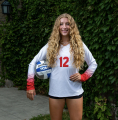References
Fueling your body is essential to maintaining your health and performing at your best. Food is fuel afterall, and as athletes, we need to be ready to rock and roll in training, in the classroom, and playing the sport we love.
But when you have dietary restrictions, whether by choice or by necessity, figuring out how to fuel properly can be tricky. In this article, we’ll address how pescatarians can meet all of their nutritional needs.
We spoke with Yasi Ansari, MS, RDN, CSSD, a registered dietitian and VIS expert, who explains, “following a pescatarian diet can comfortably meet your needs for muscle building with an appropriately planned eating pattern that encourages eating consistently throughout the day.”
This looks different for everyone. It is all based on your energy level, hunger cues throughout the day, and the type of training you participate in. For some, every 3-4 hours would be beneficial, while for others could be every 2-3 hours. Still, the ultimate goal is ensuring you get enough protein, carbs, and fats, and consistently spread out your protein intake throughout the day to meet your goals.
So what exactly is a pescatarian diet?
The pescatarian diet emphasizes plant-based foods that provide important micronutrients, fiber, and prebiotics for overall health. Being a pescatarian means not eating all meats, including chicken, beef, and pork.
Nutrients every pescatarian needs:
Protein
There are a variety of options when it comes to getting your source of protein, like seafood, eggs, and beans. We connected with VIS expert and cyclist Anna Hicks, who has a Nutrition Science degree and works for a sports nutrition company. She says the most important thing to remember is that non-animal-based proteins are considered “complete” proteins.
“Complete” proteins contain all nine essential amino acids, organic compounds of carbon, hydrogen, nitrogen, and oxygen. This is great for creating a balanced diet and can help increase performance. For example, beans and rice together provide all nine essential amino acids.
To simplify it, fish, eggs, and dairy, all provide all nine essential amino acids and are considered "complete" proteins.
Omega-3s
The pescatarian diet is high in omega-3 fatty acids that reduce inflammation, protect heart function, and support hormonal health. Reducing inflammation can reduce recovery time. Refueling after a workout is part of your recovery, so don’t go too long after a training session before your eating window to help maintain and increase muscle mass.
Iron
One of the major problems that women can struggle with is a lack of iron, and we want to tackle that head-on! There are multiple ways to increase dietary iron other than red meat. Fish, particularly tuna and sardines, provide heme iron that can be more easily absorbed, making it a great option for athletes. Other sources can include beans, tofu, spinach, and lentils, but they are harder to absorb and digest because they are non-heme sources of iron. When consuming non-heme sources of iron, it is encouraged to consume them with a source of vitamin C to help improve absorption. An overlooked alternative could be simply cooking your meals on an iron skillet or “iron fish” to increase the amount of iron in meals.
The pescatarian diet is unique and getting the necessary nutrients will only benefit you as an athlete. Mixing protein, omega-3s, and iron into your diet as much as possible will help you stay fueled, but make sure to reach out to a registered dietitian or nutritionist to discuss your dietary needs and how to best fuel your body!





